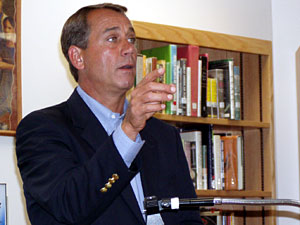Audio
Photos
More from MPR
Your Voice
| |||||||||||||||||||||||||||||||||||||||||
Pols get earful from educators on No Child Left Behind law
August 5, 2004
 |
| Congressman John Boener says there has to be a way to close the achievement gap between children based on race and income. (MPR Photo/Tom Scheck) |
Woodbury, Minn. — The majority of the school leaders came from the southern, eastern and northern Twin Cities suburbs represented by Congressmen John Kline and Mark Kennedy, who hosted the event. The two said they had hoped that the audience could convey their concerns over federal education policies to Ohio Congressman John Boener, a leader in crafting federal education policies, including No Child Left Behind. Boener said he hoped the discussion would help him get an idea of some of the law's problems.
The audience was more than happy to point out the concerns about requirements and funding.
 | |||
"All you do is mandate, mandate, mandate and it puts the monkey on us," said Mike Stark, a school board member with Independent School District 15, which is in St. Francis, Minn.
He says he's concerned that the federal government isn't fully funding special education and the No Child Left Behind law, which requires tough new accountability standards and additional teacher training. Stark says his schools can't afford all of the new requirements.
"Show me how I'm going to pay my special ed teachers now or the education assistants because they now need a two-year degree. Where's the money coming from?" he asked.
Supporters of the law say there are exemptions for teacher training in rural areas. Special education funding has increased in the past four years, but Congress has never paid for its initial promise of picking up 40 percent of the cost.
Other school administrators say they're concerned that a few special needs students could cause their schools to receive failing grades under the No Child Left Behind law. The law requires increased student testing and identifies schools that aren't making adequate yearly progress in math and reading. Schools that don't make sufficient annual progress for two or more years could see financial penalties.
"Frankly it's a shame-based type of motivator and that's not going to work for us," said Dave McKeag, the principal of Valley Middle School in Apple Valley. "We're not going to get a monetary hit, what we're going to get is a public-relations hit as our name gets mentioned in the paper as not making adequate yearly progress because we had one or two students who didn't take the test seriously because they were off their game that day."
An official with the Minnesota Association of School Administrators says some people will be shocked when the annual yearly progress report comes out later this month. He says some of the finest schools in the state may be put on the list.
 | |||
Others say they're not happy that students have to take additional standardized tests while schools undergo budget cuts. Rosemount High School science teacher Evita Connix says schools in the state are struggling to budget for books, lab equipment and other supplies. She says state and federal lawmakers should be more concerned about funding and less concerned about testing.
"How is having one more test, one more federal or state mandated test going to improve that situation? I just don't see it. I know how to write a test. I know how to evaluate. I'll use multiple methods whether it's portfolios, hands on labs, students doing presentations and tests that are more paper and pencil. We need all of those things," Connix said.
Congressmen Kennedy and Kline sat quietly during most of the question and answer period. Both say they want to find more money for special education and impoverished children. Kennedy also points out that he voted against the No Child Left Behind law. Kline wasn't in office when the law was passed in 2001.
For his part, Congressman Boener says there has to be a way to close the achievement gap between children based on race and income. He says the federal law gives the government and local communities an opportunity to know which schools are doing well and which ones aren't.
"The community deserves to see what's happening there. As I said before, there's a conversation that's happening in every school district in America. It's good for those of us in education. It's good for parents. It's good for communities and in the end it will bring all of us much closer together," he said.
Boener says he hopes to work in Congress to improve some of the funding measures for the law when Congress returns from the August break.
|
News Headlines
|
Related Subjects
|

